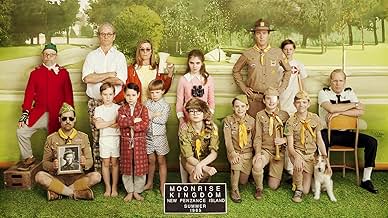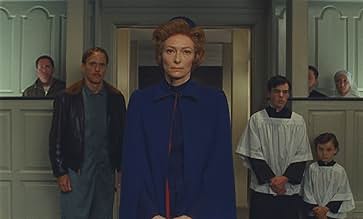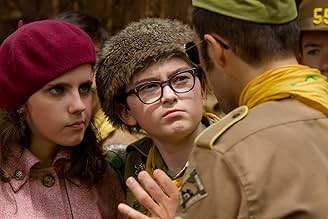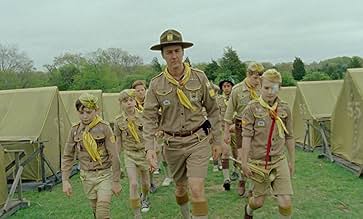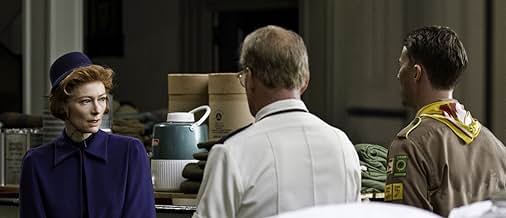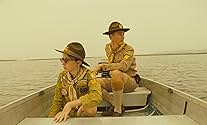Un par de jóvenes huyen de su ciudad en Nueva Inglaterra, haciendo que un grupo de búsqueda se desplace para encontrarlos.Un par de jóvenes huyen de su ciudad en Nueva Inglaterra, haciendo que un grupo de búsqueda se desplace para encontrarlos.Un par de jóvenes huyen de su ciudad en Nueva Inglaterra, haciendo que un grupo de búsqueda se desplace para encontrarlos.
- Nominado a 1 premio Óscar
- 36 premios ganados y 121 nominaciones en total
Robert Hadlock
- Deluca
- (as Rob Campbell)
- Dirección
- Guionistas
- Todo el elenco y el equipo
- Producción, taquilla y más en IMDbPro
Opiniones destacadas
The thing that I enjoy most about Wes Anderson films is that they each feel like a great adventure and in this sense I think Moonrise Kingdom is his best yet. It tells that tale of Sam, an orphan on scout camp, and Suzy, a misunderstood girl, as they run away together. At first I found the two actors playing the kids to be kind of limp but after a few minutes I warmed to them and I actually think they were both pretty good overall, particularly Jared Gilman who plays Sam and even more so knowing that it's the first acting he's ever done. The rest of the cast are all pursuing or helping them in some way and there a couple of sub-plots with the island's policeman (played by Bruce Willis) and the parents of Suzy (Bill Murray and Frances McDormand).
I thought that the rest of the cast was great. In fairness I am a bit biased because I love Bill Murray, Edward Norton, Bruce Willis and Frances McDormand but even so I have to say that they were all really good, especially Edward Norton who plays the scout master, and Bill Murray. There are also a couple of minor roles for Jason Schwartzman, Harvey Keital and Tilda Swinton who were also a lot of fun. Everyone in the cast fits into their role really well which is obviously exactly what you want, but not only is that the case for the main roles but also for the less important ones, like the scout troupe (especially Sam's 'enemy'), Suzy's three brothers or the oddball narrator.
Cinematography wise I didn't think this movie was particularly spectacular, especially in comparison to other Wes Anderson movies like 'The Life Aquatic' or 'The Royal Tenenbaums'. There were a couple of shots that were cool though, some really long zoom outs (which sounds clichéd but it worked) and the doll house type ones that I love and think are awesome.
I wouldn't expect to wet your pants laughing at any moment in 'Moonrise Kingdom' but it is funny. There are a couple of laugh out loud moments and as a whole the jokes are pretty sharp and intelligently done. The reason I like the humour in this movie is that it's a part of the ambiance and feel of it, it won't make you crack up but it will make you have a smile on your face for pretty much the whole thing and leave you feeling strangely happy.
That kind of ambiance is really why the movie is so good, and is possibly Wes Anderson's best movie. The whole story is this fantastic blend of reality and child-like dreaming and it's wonderful. At times I felt kind of nostalgic and sad that I'm not a kid anymore. On the other hand it feels like a tribute to those myths and dreams of being a child and it works so well. This is the kind of film that I feel I could watch over and over again, each time spotting something new but also feeling good and enjoying the overall purpose.
Definitely go and see it!
I thought that the rest of the cast was great. In fairness I am a bit biased because I love Bill Murray, Edward Norton, Bruce Willis and Frances McDormand but even so I have to say that they were all really good, especially Edward Norton who plays the scout master, and Bill Murray. There are also a couple of minor roles for Jason Schwartzman, Harvey Keital and Tilda Swinton who were also a lot of fun. Everyone in the cast fits into their role really well which is obviously exactly what you want, but not only is that the case for the main roles but also for the less important ones, like the scout troupe (especially Sam's 'enemy'), Suzy's three brothers or the oddball narrator.
Cinematography wise I didn't think this movie was particularly spectacular, especially in comparison to other Wes Anderson movies like 'The Life Aquatic' or 'The Royal Tenenbaums'. There were a couple of shots that were cool though, some really long zoom outs (which sounds clichéd but it worked) and the doll house type ones that I love and think are awesome.
I wouldn't expect to wet your pants laughing at any moment in 'Moonrise Kingdom' but it is funny. There are a couple of laugh out loud moments and as a whole the jokes are pretty sharp and intelligently done. The reason I like the humour in this movie is that it's a part of the ambiance and feel of it, it won't make you crack up but it will make you have a smile on your face for pretty much the whole thing and leave you feeling strangely happy.
That kind of ambiance is really why the movie is so good, and is possibly Wes Anderson's best movie. The whole story is this fantastic blend of reality and child-like dreaming and it's wonderful. At times I felt kind of nostalgic and sad that I'm not a kid anymore. On the other hand it feels like a tribute to those myths and dreams of being a child and it works so well. This is the kind of film that I feel I could watch over and over again, each time spotting something new but also feeling good and enjoying the overall purpose.
Definitely go and see it!
Greetings again from the darkness. Not many people think like Wes Anderson. That's probably a good thing in real life. It's definitely a good thing for movies. He is a creative and distinct filmmaker, though not one with mass appeal. My two personal favorites of his are The Royal Tenenbaums and Rushmore. His previous film, Fantastic Mr Fox, was a solid hit and critically lauded. Now he delivers one that will probably only click with his core fans. It's a thing of beauty ... if you keep in mind that beauty is in the eye of the beholder.
Set on the fictional New Penzance Island off the coast of New England in 1965, the movie opens with terrific visuals of the Bishop family's lighthouse/home. Our tour is conducted as if the home were a dollhouse, and our eyes struggle to keep up with the detailed decor. We are struck by the color palette of tans, greens and splashes of red. This will continue throughout the movie.
The story centers around two 12 year old misfits: Sam and Suzy. Sam is an orphan and outcast in his Khaki Scouts troop, and Suzy is misunderstood and ignored by her selfish parents, who communicate with a bullhorn and through legalese at bedtime (they are both lawyers). Sam and Suzy are attracted to each other's misery and decide to run away together. This ignites a flurry of activity on this quiet island and showcases two first time actors with remarkable screen presence: Jared Gilman (Sam) and Kara Hayward (Suzy).
The "grown-ups" on the island include Suzy's parents played by Bill Murray (a Wes Anderson staple) and Frances McDormand. The island police chief is played Bruce Willis, who we soon figure out is also a social outcast. The Scoutmaster is played by Edward Norton in a regimented weirdness that will have you laughing in confoundment. For such serious topics, Mr. Anderson and co-writer Roman Coppola provide us many comedic moments - both through dialogue and site gags.
During the search, other colorful supporting characters get involved. Social Services is after Sam. Tilda Swinton plays Social Services. In one of the few gags, I'll give away, Swinton's character only introduces herself as Social Services. This is a gut punch to a system that is often under-staffed and forgetful of it's true mission. We also get Jason Schwartzman as a very helpful, though slightly seedy, Cousin Ben. Harvey Keitel plays the senior Scoutmaster who is unhappy with Norton for losing a scout. Bob Balaban makes periodic appearances as a narrator ... either for a documentary or for the movie, depending on the moment's need.
The script does a wonderful job of capturing how the 12 year old brain works. Some of the scenes with Sam and Suzy are almost like looking a photo album ... exactly the way our childhood memory works. Flashes of moments. The Alexandre Desplat score is heavy on percussion, but it works well with the minimalistic look of the film. It's also interesting to note that this is one of the few movies where it makes sense to have a soundtrack with Benjamin Britten, Hank Williams and Mozart! If you go to this one, keep your eyes open and moving, and your ears receptive. The payoff is worth it.
Set on the fictional New Penzance Island off the coast of New England in 1965, the movie opens with terrific visuals of the Bishop family's lighthouse/home. Our tour is conducted as if the home were a dollhouse, and our eyes struggle to keep up with the detailed decor. We are struck by the color palette of tans, greens and splashes of red. This will continue throughout the movie.
The story centers around two 12 year old misfits: Sam and Suzy. Sam is an orphan and outcast in his Khaki Scouts troop, and Suzy is misunderstood and ignored by her selfish parents, who communicate with a bullhorn and through legalese at bedtime (they are both lawyers). Sam and Suzy are attracted to each other's misery and decide to run away together. This ignites a flurry of activity on this quiet island and showcases two first time actors with remarkable screen presence: Jared Gilman (Sam) and Kara Hayward (Suzy).
The "grown-ups" on the island include Suzy's parents played by Bill Murray (a Wes Anderson staple) and Frances McDormand. The island police chief is played Bruce Willis, who we soon figure out is also a social outcast. The Scoutmaster is played by Edward Norton in a regimented weirdness that will have you laughing in confoundment. For such serious topics, Mr. Anderson and co-writer Roman Coppola provide us many comedic moments - both through dialogue and site gags.
During the search, other colorful supporting characters get involved. Social Services is after Sam. Tilda Swinton plays Social Services. In one of the few gags, I'll give away, Swinton's character only introduces herself as Social Services. This is a gut punch to a system that is often under-staffed and forgetful of it's true mission. We also get Jason Schwartzman as a very helpful, though slightly seedy, Cousin Ben. Harvey Keitel plays the senior Scoutmaster who is unhappy with Norton for losing a scout. Bob Balaban makes periodic appearances as a narrator ... either for a documentary or for the movie, depending on the moment's need.
The script does a wonderful job of capturing how the 12 year old brain works. Some of the scenes with Sam and Suzy are almost like looking a photo album ... exactly the way our childhood memory works. Flashes of moments. The Alexandre Desplat score is heavy on percussion, but it works well with the minimalistic look of the film. It's also interesting to note that this is one of the few movies where it makes sense to have a soundtrack with Benjamin Britten, Hank Williams and Mozart! If you go to this one, keep your eyes open and moving, and your ears receptive. The payoff is worth it.
In the past, Anderson has whirled us from melancholy dreamscapes set deep below the Pacific to tales of inter-generation betrayals in the name of love, from doomed romances in Paris hotels to deliriously bizarre animal revolutions in the English countryside. But for all the retro-stylings his films so proudly wear, Moonrise Kingdom is Anderson's first period piece - a tender love story set in the sepia-soaked sixties of Anderson's youth that have worked their influence into every one of his movies. It is fitting that this film is his most childlike - not in any way any simpler than his other films (as anyone with an accurate memory of childhood will remember all it's complexities; the way each trivial thing became a nest of thorns), but an accurate and deeply heartfelt depiction of childhood. It is not aiming to be as crushingly dramatic as Life Aquatic or as deeply tragic as Hotel Chevalier, because that wouldn't be appropriate for the story it's trying to tell. Instead, while still bearing Anderson's still surprising streak of black humour (some acts of violence really catch you off-guard; then again, children are violent so hats off Wes), it is largely concerned with the dramas and tragedies of youth. Yes, it is less ambitious than say The Life Aquatic but it also has none of the flaws that that film does (and believe me, I am a massive Steve Zissou fan). Instead, it is perfectly executed, wonderfully acted poignant beauty, with fantastic performances across the board (especially from newcomers Gilman and Hayward). This, while not his most ambitious, is certainly Anderson's most perfect work so far. You owe it to yourself to see this movie.
The year is 1965 and a remote North Eastern coastal community is plunged into confusion when it discovers that two kids have run away. Sam, a discontented Khaki Scout, and Suzy, a put-upon older sister and forgotten daughter, abscond into the forest to escape their dissatisfying existences. The responsible adults – Sam's Scout Master Ward (Edward Norton) and Suzy's parents (Bill Murray and Frances McDormand) – and the entire town set out on a frenzied search, which gets wild when the largest storm in recorded history touches down and puts everyone's life into question. What ensues is a battle between youth and age, hope and disillusionment, faith and cynicism.
In terms of story and character, Wes Anderson's previous films, especially The Royal Tenenbaums and The Darjeeling Limited, are superior. Even in the most compelling relationship in the film between Captain Sharp (Bruce Willis) and Sam doesn't embody Anderson's ability to take his characters into deep emotional places of hurt and healing without melodrama. However, the newest addition to the Anderson canon is a cinematic experience.
Moonrise Kingdom's story, co-written with Roman Coppola, takes a definite backseat to style, as Anderson saturates the entire film with a "Norman Rockwell-type of Americana". Stylistically, it may be Anderson's most masterful work, as the costumes, sets, and settings transport the viewer to an alternate universe, a place of wonder and adventure. The soundtrack is especially effective, as it recalls a time when things were simpler: Hank Williams was on the radio, and children listened to records instead of playing video games. However, Anderson isn't content with reminiscing about the year 1965. He takes this nostalgia and twists it, infusing the film with a twinge of sadness through the reality of life's disappointments. He doesn't reject the Rockwellian view of America, but argues that it doesn't tell the whole story.
Moonrise Kingdom is that place of beauty and passion that we all have been in at least once in our lives – the one place on earth where we believe that anything is possible. It has since been lost, but it persists in our memories in moments of nostalgia.
In terms of story and character, Wes Anderson's previous films, especially The Royal Tenenbaums and The Darjeeling Limited, are superior. Even in the most compelling relationship in the film between Captain Sharp (Bruce Willis) and Sam doesn't embody Anderson's ability to take his characters into deep emotional places of hurt and healing without melodrama. However, the newest addition to the Anderson canon is a cinematic experience.
Moonrise Kingdom's story, co-written with Roman Coppola, takes a definite backseat to style, as Anderson saturates the entire film with a "Norman Rockwell-type of Americana". Stylistically, it may be Anderson's most masterful work, as the costumes, sets, and settings transport the viewer to an alternate universe, a place of wonder and adventure. The soundtrack is especially effective, as it recalls a time when things were simpler: Hank Williams was on the radio, and children listened to records instead of playing video games. However, Anderson isn't content with reminiscing about the year 1965. He takes this nostalgia and twists it, infusing the film with a twinge of sadness through the reality of life's disappointments. He doesn't reject the Rockwellian view of America, but argues that it doesn't tell the whole story.
Moonrise Kingdom is that place of beauty and passion that we all have been in at least once in our lives – the one place on earth where we believe that anything is possible. It has since been lost, but it persists in our memories in moments of nostalgia.
Saw this just now in a small indie cinema in Heidelberg, Germany and I have to say, it was a romp. In my humble opinion this film manages to be both Wes Anderson's funniest picture so far and his most melancholic. The utter uncompromising stylishness of his other work is also present here, perhaps even heightened, but in contrast to The Life Aquatic (and to a certain degree The Darjeeling Limited), the emphasis here is firmly on plot. The brave and often odd visuals never overwhelm the story and the audience never feels like they are not quite in on the joke, like in The Life Aquatic. The tone does tend to become a bit erratic, especially in the last third of the film when Anderson seems to want to pack so much into every frame that the film becomes a bit cartoonish at times (hence the not-perfect score from me). All in all, though, the plot is very balanced and the pacing is great. The two young leads are superb and the brave move by Anderson to place unknown actors front and centre pays off beautifully. The rest of the cast is on paper even more star-studded than The Royal Tenenbaums and yet Anderson never steers into unnecessary character development just to accommodate his stars. A touch here and a touch there are more than enough to paint a picture of a group of people who are eerily similar in their dissatisfaction with their lives and yet react quite differently to the two young lovers' dash (literally) for happiness. In conclusion, a must-see for Anderson fans and highly recommended for everyone else.
Wes Anderson Films as Ranked by IMDb Rating
¿Sabías que…?
- TriviaThe dance scene on the beach was saved for the very end of filming, so that the two young leads would be comfortable around each other, and was done on a closed set (just the two leads, co-writer and director Wes Anderson, and the cameraman).
- ErroresThe pilot of the plane incorrectly says the word "five" as "fiver". In standard aviation phonetics--NATO alphabets--the number "nine" is pronounced "niner", to distinguish it from "five", which is pronounced as "fife".
- Créditos curiososDuring the final credits, Alexandre Desplat's music is vocally decomposed, like it was for the piece of classical music during the movie.
- ConexionesFeatured in At the Movies: Cannes Film Festival 2012 (2012)
- Bandas sonorasThe Young Person's Guide to the Orchestra, Op. 34: Themes A.-F.
(1946)
Composed by Benjamin Britten
Performed by New York Philharmonic
Conducted by Leonard Bernstein
Narrated by Henry Chapin (uncredited)
Selecciones populares
Inicia sesión para calificar y agrega a la lista de videos para obtener recomendaciones personalizadas
24 Frames From Wes Anderson Films
24 Frames From Wes Anderson Films
Explore the memorable career of Wes Anderson through 24 stills from his movies.
Detalles
- Fecha de lanzamiento
- País de origen
- Sitios oficiales
- Idioma
- También se conoce como
- Moonrise Kingdom
- Locaciones de filmación
- Fort Wetherill State Park, Jamestown, Rhode Island, Estados Unidos(moonrise kingdom cove)
- Productoras
- Ver más créditos de la compañía en IMDbPro
Taquilla
- Presupuesto
- USD 16,000,000 (estimado)
- Total en EE. UU. y Canadá
- USD 45,512,466
- Fin de semana de estreno en EE. UU. y Canadá
- USD 522,996
- 27 may 2012
- Total a nivel mundial
- USD 68,298,842
- Tiempo de ejecución
- 1h 34min(94 min)
- Color
- Mezcla de sonido
- Relación de aspecto
- 1.85 : 1
Contribuir a esta página
Sugiere una edición o agrega el contenido que falta







